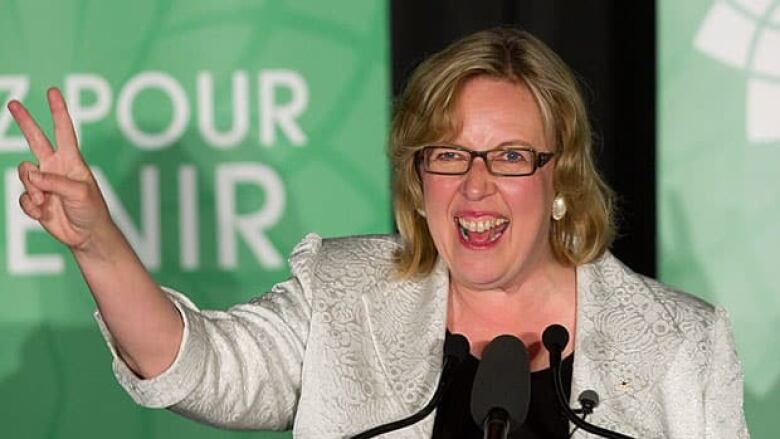Record number of women elected

There will be more female faces in the House of Commons following Monday's federal election that saw 76 women elected.
In the 2008 election, 69 women were elected. One resigned last year, bringing the number down to 68female MPs when the election was called in March.
According to the unofficial results posted on Parliament's website, the NDP elected the most women MPs 40 of them are among the 102 MPs who make up the new Official Opposition party. Twenty-seven of the women MPs are from Quebec.
One out of the four Bloc Quebecois MPs elected is a woman, while the Liberals have six women in their reduced caucus of 34 MPs. The Conservative majority government has 28 women in its 167-member caucus.
Green Party Leader Elizabeth May made history Monday night by winning her party's first ever seat in the House of Commons and she will be the only female federal leader on Parliament Hill.
In total, women will sit in 25 per cent of the 308 seats in the House of Commons.
Equal Voice, an organization dedicated to electing more women, called the results "a historic high" and said Canada now ranks in the top 40 countries for its female representation in Parliament. Sixty-nine was the previous record, according to the group.
"It signifies that Canada is moving forward," saidEqual Voice'snational chair, Donna Dasko, in a statement.
Equal Voice is now urging Prime Minister Stephen Harper to include a high number of women in his new cabinet.
The previous one included Senator Marjory LeBreton and nine women MPs who were all re-elected with the exception of Josee Verner. Since her first election in 2006 she served as minister of international co-operation, official languages minister, heritage minister and minister for the status of women. She lost her Quebec seat to another woman, the NDP's Alexandrine Latendresse.
The Liberals, who saw their total seat count reduced from 77 to 34, lost a number of experienced women MPs and some who were gaining prominence within the party and on Parliament Hill. Marlene Jennings, Martha Hall Findlay, Anita Neville, Maria Minna, Bonnie Crombie, Ruby Dhalla and Siobhan Coady will not be coming back to Ottawa.
Among those who survived the historic Liberal defeat and kept their seats are Carolyn Bennett, Kirsty Duncan, Judy Foote, Hedy Fry, and Joyce Murray.
There were a number of women running in some highly-anticipated and closely-watched races who were successful in their bids to become an MP some for the first time, others for a second.
In Toronto's Parkdale-High Park riding, the NDP's Peggy Nash got her seat back from Liberal Gerard Kennedy, who took it away from her in the 2008 election.
Helena Guergis failed to keep her seat in Simcoe-Grey, runningas an Indepedent Conservative candidate after getting kicked out of the Conservative caucus. But the riding will still be represented by a woman asConservative Kellie Leitch sailed to victory.
With the NDP now the official Opposition party, there will be opportunities for some ofthe 40 women in its caucus to heighten their profiles in federal politics. Among those who could play more prominent roles are Olivia Chow, Megan Leslie, Carol Hughes, Chris Charlton, Niki Ashton, Libby Davies, Linda Duncan andIrene Mathyssen.












_(720p).jpg)


 OFFICIAL HD MUSIC VIDEO.jpg)
.jpg)



























































































